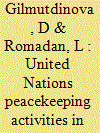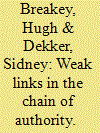| Srl | Item |
| 1 |
ID:
146003


|
|
|
|
|
| Summary/Abstract |
The main significance and novelty of the Intervention Brigade established by the United Nations (UN) Security Council in March 2013 in the Democratic Republic of the Congo have previously been attributed to its robust mandate, enhanced capacities and offensive concept of operations. At the tactical, strategic and doctrinal levels of analysis, the Brigade could be considered a continuum of the robust and technological turn of UN peacekeeping, which has continued for more than a decade and is reinvigorated in the so-called new generation of peacekeeping tactics outlined in the New Horizon document. However, this article argues that the most profound significance and novelty of the Brigade reside at the underlying paradigmatic level, which has been ignored in the previous literature. The Brigade embodies not only robust capacities and mandate (peacekeeping with muscles) but also a new peacekeeping paradigm, namely, sovereignty-building (peacekeeping for body politic). The sovereignty-building paradigm is aimed at creating or strengthening the positive and negative sovereignty of the host government. The Brigade reinforces the positive sovereignty of the Congolese government by boosting its self-directive domestic and foreign policy, political will, ownership and responsibility vis-à-vis its regional peers, for example, by making its exit strategy conditional on the Congolese own Rapid Reaction Force. With regard to negative sovereignty, the Brigade contributes to the reinstatement of territorial integrity and supreme state authority by neutralising militia groups.
|
|
|
|
|
|
|
|
|
|
|
|
|
|
|
|
| 2 |
ID:
146281


|
|
|
|
|
| Summary/Abstract |
THE UNITED NATIONS peacekeeping operations are a key means of settlement of armed conflicts and post-conflict political normalization. Due to the escalation of some conflicts, they are more important in the 21st century than ever before.
|
|
|
|
|
|
|
|
|
|
|
|
|
|
|
|
| 3 |
ID:
133936


|
|
|
|
|
| Publication |
2014.
|
| Summary/Abstract |
The United Nations Security Council mandates peacekeeping operations to protect civilians, and regularly authorizes operations to use force to achieve this objective. Yet in the challenging situations facing contemporary peacekeeping operations, local civilians remain vulnerable to extreme violence. One set of reasons for this unwelcome result surrounds the decisions to protect civilians forcefully in any given context. This paper describes how peacekeeping operations vest discretion over the use of robust force across multiple agents. Using signal detection theory to model the decision-making of these agents, our analysis shows how the iterative nature of the decision-making process gives rise to a chain of authority where the most conservative decision-maker tends to prove decisive. With this analysis in tow, we turn our attention to recent protection initiatives, including Security Council Resolution 2098 (2013) and its controversial mandate for the new 'Intervention Brigade' in the Democratic Republic of the Congo.
|
|
|
|
|
|
|
|
|
|
|
|
|
|
|
|